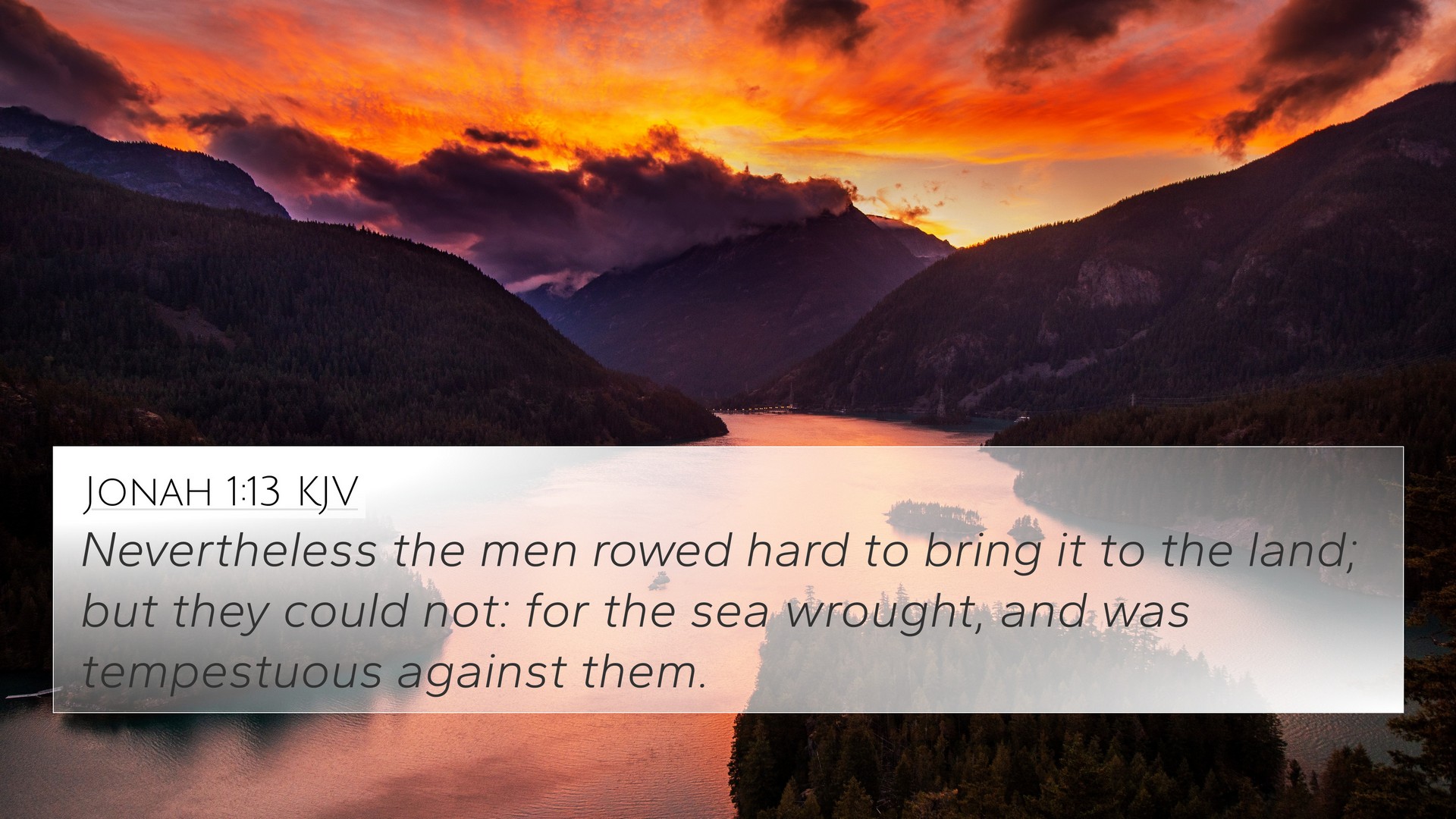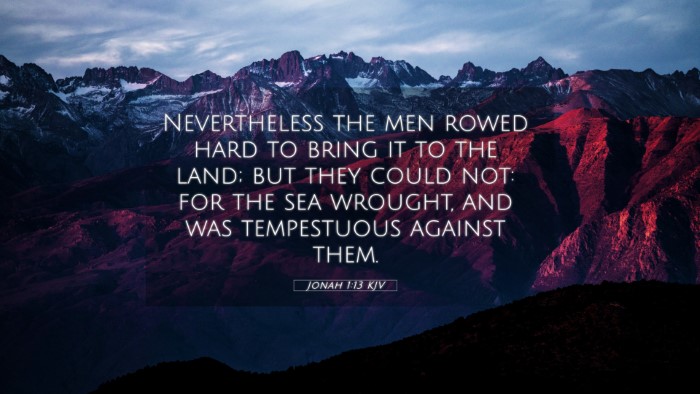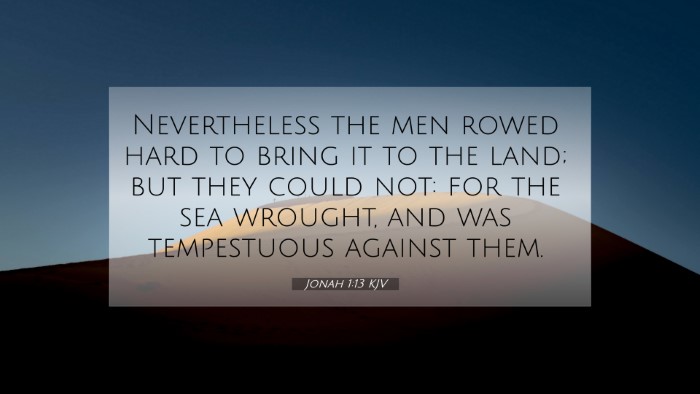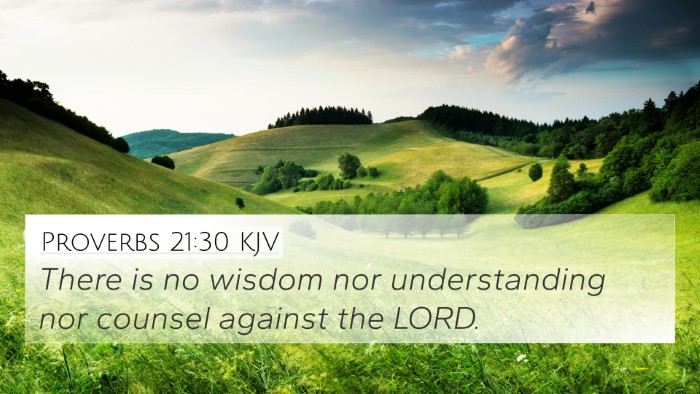Old Testament
Genesis Exodus Leviticus Numbers Deuteronomy Joshua Judges Ruth 1 Samuel 2 Samuel 1 Kings 2 Kings 1 Chronicles 2 Chronicles Ezra Nehemiah Esther Job Psalms Proverbs Ecclesiastes Song of Solomon Isaiah Jeremiah Lamentations Ezekiel Daniel Hosea Joel Amos Obadiah Jonah Micah Nahum Habakkuk Zephaniah Haggai Zechariah MalachiJonah 1:13 Similar Verses
Jonah 1:13 Cross References
Nevertheless the men rowed hard to bring it to the land; but they could not: for the sea wrought, and was tempestuous against them.
Uncover the Rich Themes and Topics of This Bible Verse
Listed below are the Bible themes associated with Jonah 1:13. We invite you to explore each theme to gain deeper insights into the Scriptures.
Jonah 1:13 Cross Reference Verses
This section features a detailed cross-reference designed to enrich your understanding of the Scriptures. Below, you will find carefully selected verses that echo the themes and teachings related to Jonah 1:13 KJV. Click on any image to explore detailed analyses of related Bible verses and uncover deeper theological insights.

Job 34:29 (KJV) »
When he giveth quietness, who then can make trouble? and when he hideth his face, who then can behold him? whether it be done against a nation, or against a man only:
Jonah 1:13 Verse Analysis and Similar Verses
Understanding Jonah 1:13
In Jonah 1:13, we see a pivotal moment in the story of the prophet Jonah as he tries to escape from God's command. The verse reads:
"Nevertheless the men rowed hard to bring it to the land; but they could not: for the sea wrought, and was tempestuous against them."
Verse Meaning Summary
This verse highlights the desperation of the sailors aboard the ship with Jonah. Despite their efforts to save themselves and Jonah, their human strength is insufficient against the tempestuous sea. They realize that divine intervention is necessary, demonstrating a central theme in the narrative of Jonah: the futility of fleeing from God's will.
Commentary Insights
Matthew Henry
Matthew Henry emphasizes the sailors' frantic efforts, showcasing their bravery and desperation. He notes that their rowing symbolizes human effort to confront divine judgment. Despite their toil, the raging storm is a divine message, illustrating that no one can evade God's commands.
Albert Barnes
Albert Barnes interprets this verse by pointing to the futility of the sailors' labor. He details that even with their strength, they were unable to cope with the storm, symbolizing man’s powerlessness in face of divine authority. Barnes reinforces this idea by highlighting that the chaos of the sea is a result of Jonah's attempt to escape God's purpose.
Adam Clarke
Adam Clarke offers a perspective on the moral implications of the verse. He suggests that the sailors’ struggles not only reflect their physical toil but also serve as an allegory for spiritual resistance to God’s plans. Their actions in attempting to save Jonah represent humanity's tendency to resist divine authority, often leading to turmoil.
Connections to Other Scriptures
Jonah 1:13 draws several connections to other passages in the Bible, illustrating themes of divine authority, human effort, and the futility of resisting God’s will. Below are some notable cross-references:
- Psalm 107:25-27: Discusses sailors facing storms and recognizing God's hand in their distress.
- Proverbs 21:30: Emphasizes that no wisdom or understanding can prevail against the Lord.
- Matthew 8:24: Illustrates Christ's authority over the seas, echoing the fear and helplessness of the sailors.
- Acts 27:15: Paul encounters a tempest at sea, mirroring Jonah's experience and God's control over nature.
- Hebrews 12:29: Highlights God's unchanging nature and authority, akin to the tempest in Jonah's story.
- Isaiah 43:2: God's promise to be with us through trials, comparable to Jonah's plight at sea.
- James 4:9-10: Calls for humility in the sight of God, aligning with Jonah's internal conflict.
Thematic Bible Verse Connections
The themes illustrated in Jonah 1:13 and its connections can be explored further through a variety of contexts:
- Human Struggle vs. Divine Will: Many biblical narratives reflect the tension between human choices and divine plans.
- The Importance of Obedience: Jonah’s story is a cautionary tale about the importance of heeding God’s direction.
- God's Sovereignty: This theme is prominent throughout both the Old and New Testaments, emphasizing that ultimate control belongs to God.
Tools for Cross-Referencing Bible Scriptures
For deeper study and analysis, utilizing tools for Bible cross-referencing can enhance your understanding:
- Use a Bible concordance to find related verses by keywords.
- Explore a cross-reference Bible study guide for thematic connections.
- Engage with Bible reference resources to enhance sermons and teachings.
Inter-Biblical Dialogue
The narrative of Jonah has significant parallels in scripture, challenging believers to interpret themes through inter-Biblical dialogue. This powerful method of studying Scripture can enrich one’s faith and lead to a deeper understanding of God's nature.
Conclusion
Jonah 1:13 serves as a profound reminder of the interaction between human endeavors and divine sovereignty. As the sailors struggled against the tempest, they symbolize humanity's plight when attempting to evade God's will. The themes derived from this verse resonate through various other scripture, providing a rich landscape for study and reflection.



